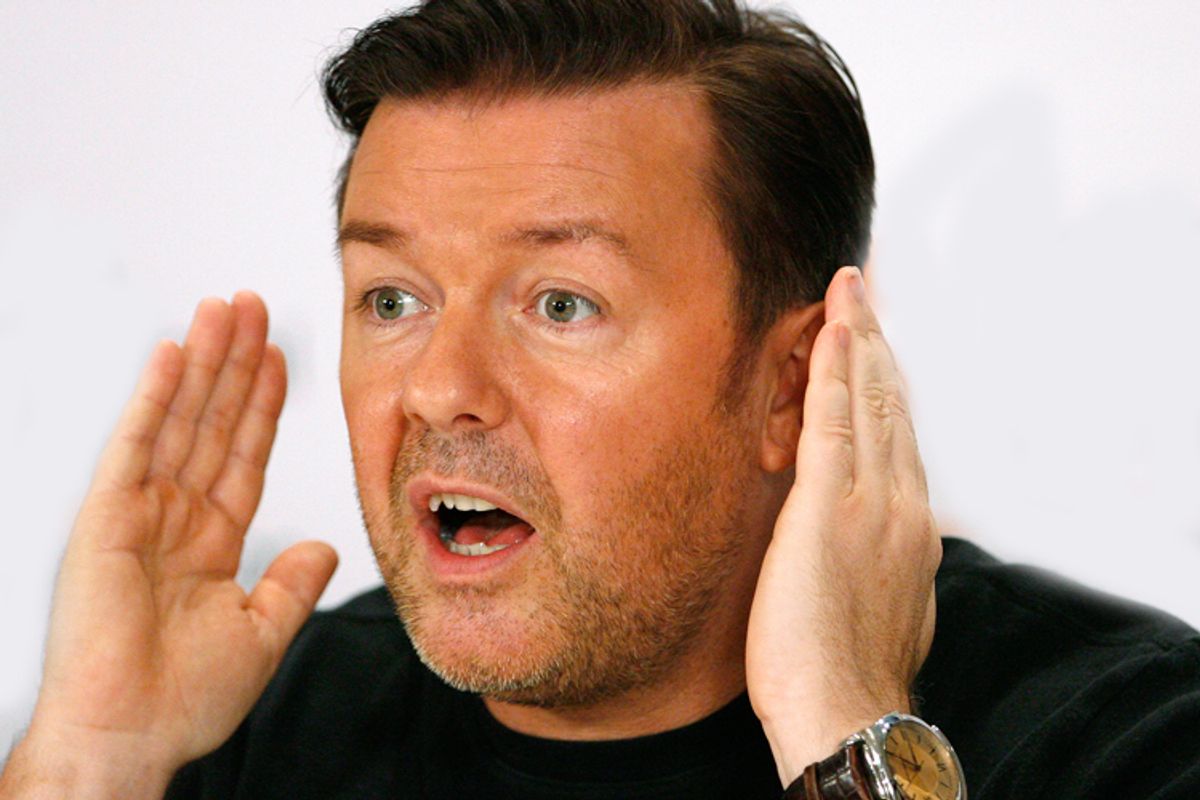The most dynamic, persuasive atheist in the world isn't Richard Dawkins or Christopher Hitchens. It's not a scientist or Pulitzer Prize winner. It's the person who took the comedy of discomfort to unparalleled heights as the creator of "The Office." It's the stand-up comic who's hosting the Golden Globes.
In addition to his upcoming gig steering the Globes, Ricky Gervais is currently gearing up for a new season of his animated series, just aired a recent stand-up special on HBO, and is probably blogging, podcasting or directing something hilariously brilliant right this moment. And as the current most ubiquitous person in show business (non-Disney payroll division) he is also a man who consistently infuses his public persona with a refreshingly steadfast, rational and profoundly empathetic brand of godlessness.
Unlike those who would rub what they want you to "know" in your face, Gervais has a gentlemanly, eminently British way of conveying his philosophy. He considers the astonishing number of animal species in the world and understatedly muses that perhaps the story of Noah's Ark "isn't totally accurate." He refers to the Bible as "a dusty old book" that sounds "a little bit farfetched." And in a highly entertaining "holiday message" for the Wall Street Journal this week titled "Why I'm an Atheist," he wrote, "I'm saying God doesn’t exist. I’m not saying faith doesn’t exist. I know faith exists. I see it all the time. But believing in something doesn't make it true. Hoping that something is true doesn't make it true."
But Gervais isn't some Christmas killjoy, here to wag his finger at those stupid, stupid fans of the baby Jesus. He says, in fact, with breathtaking sanity, "I don’t think there is a god, but belief in him does no harm. If it helps you in any way, then that’s fine with me. It's when belief starts infringing on other people's rights when it worries me." That's an important and respectful distinction, one that many people -- atheists, skeptics and those of us who call ourselves believers -- would do well to embrace. There's a difference between espousing an ideology and using it as an excuse to bully, exploit, condemn or simply put down others.
It helps his case considerably that Gervais is a comedian; he tempers his strong opinions with all the giddy subversiveness of a naughty schoolboy. But while other comics have long mined the rich fodder that religion provides -- it's been generations since George Carlin described himself as someone who "used to be Irish Catholic, now I'm an American" -- few do it with what can only be described as Gervais' pure grace. Atheist Bill Maher took aim at a wide variety of institutions in "Religulous," but he seems permanently incapable of wiping that smug "I'm so smart and everybody else is a moron" look off his face. And though Louis C.K. did a daring, downright terrifying episode of "Louis" about Catholic school and God in general earlier this year, Gervais never seems exceptionally battle scarred about some bad church experiences or bitter about institutional corruption.
He is instead the optimist who gave us the uneven but terrifically sweet "The Invention of Lying," a movie about a guy who misguidedly dreams up a "man in the sky" to console his dying mother. He can explain that "it's strange that anyone who believes that an all-powerful all-knowing, omniscient power responsible for everything that happens, would also want to judge and punish people for what they are," because he understands that whatever you believe, being right isn't the same as being kind.
Sure, he paints in comically broad strokes -- not all of us who espouse a spiritual philosophy take the story of the Ark literally, or boil faith down to trusting blindly in an "all-knowing, omniscient power responsible for everything that happens." But when Gervais says, "no one owns being good," it's not a putdown. It's an expression of hope. Because if no one owns being good, then all of us can, whether we're atheists like Gervais or Sunday school teachers like Stephen Colbert. And if a guy can laugh at the absurdity of organized institutions, speak out against hypocrisy and intolerance, and still possess boundless compassion and the most wickedly infectious giggle on the planet, he may not win any converts, but he can surely open a few minds. I still believe in God. But I'm a steadfast believer in Ricky Gervais too.

Shares